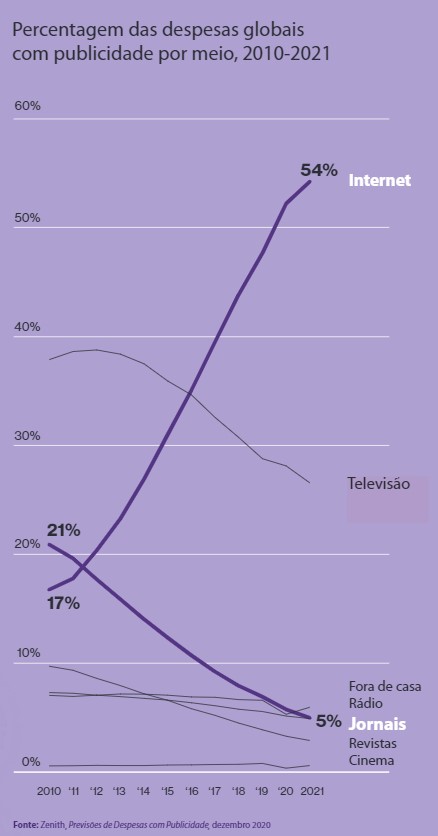World Press Freedom Day, celebrated on 3 May, was established by UNESCO over 20 years ago to celebrate the fundamental principles of journalistic freedom and strengthen governments’ commitment to journalists and the free exercise of the profession.
More than just a festive occasion, the date is also used to show support for the media and professionals who are targets of censorship, to celebrate press freedom around the world, and to honor the memory of journalists who lost their lives working in hostile environments.
Reporters Without Borders organization published as part of its efforts to mark the day. The 2022 edition of the Global Press Freedom Index, placing Brazil in 110th place out of 180 countries and UNESCO promotes a global conference can be tracked online
The origin of World Press Freedom Day
Established in 1993, it coincides with the date the Windhoek Declaration was signed two years ago.
Windhoek, the capital of Namibia, brought together African journalists who participated in the “How to promote an independent and pluralistic African media” seminar organized by UNESCO in 1991.
The final text of the event highlighted the importance of pluralism and independence in African media and set an example to be followed by the rest of the world.
Based on this, the 1993 UN General Assembly proclaimed World Press Freedom Day, following a recommendation adopted at the 26th session of the UNESCO General Conference in 1991.
The date of May 3 was also based on article 19 of the Universal Declaration of Human Rights:
“Every individual has the right to freedom of thought and expression, which means the right not to be disturbed by their views and the right to seek, receive and impart information and ideas through any means of expression, regardless of country borders”.
The UN agency is responsible for promoting freedom of the press and expression. “Unesco believes these freedoms allow for mutual understanding to build a sustainable peace,” the organization describes.
read it too
Press freedom in Latin America: Brazil among the ten worst countries, reveals global study
For UNESCO, World Press Freedom Day serves as an opportunity to inform citizens about press freedom violations.
“It is a reminder that in dozens of countries around the world, broadcasts are censored, fined, suspended and shut down, journalists and editors harassed, attacked, detained and even killed.
It is a date to encourage and develop initiatives in favor of press freedom and to assess the situation of press freedom worldwide.”
Every year UNESCO organizes a global conference to celebrate history. In 2022, the event will take place from May 2 to 5, In Punta del Leste (Uruguay), with the theme “Journalism under Digital Siege” hybrid form. Anyone interested can join the discussion at: domain your organization.
read more
World Press Freedom Day: UNESCO discusses journalism under ‘digital siege’
The importance of celebrating and defending freedom of the press
The Covid-19 pandemic and the war in Ukraine are two recent events that highlight the importance of professional journalism and freedom of the press.
spread in both fake news and Government pressure to prevent the facts from being made public resulted in hundreds of journalists being intimidated, arrested, and even killed.
World Press Freedom Day in 2022 will serve as a warning that censorship and persecution of journalists is not an initiative confined to countries under dictatorial regimes.
A new report by the Council of Europe (CoE) in partnership with the International and European Federations of Journalists (IFJ and EFJ) reveals that the continent of Europe faces a growing threat to free journalism.
In 2021, the CoE reported 282 serious press freedom violations in 35 countries – an increase of 41% from the 200 reported in 2020.
According to the EC, politicians and other government officials were responsible for 47% of reported violations in 2021. And in a growing number of countries these cases are not random.
“They are the result of a deliberate strategy to impose a ‘non-liberal’ model in complete violation of the fundamental principles of the rule of law and human rights.”
Out of 282 violations of press freedom, attacks on the security and bodily integrity of journalists, 82, arrests and detentions of journalists, and 110 cases of harassment and intimidation against journalists stand out.
read more
‘Flashing red lights’ for press freedom in Europe, study warns
Professional journalism threatened by social media
There is another dimension, social networks, which hinder the free press and confuse the pockets of media outlets – they are controlled by them. big technologies billionaires who share only a small part of their huge profits with the media.
In March, UNESCO released a report with alarming results about the world. The risks facing professional and independent journalism in the face of the exponential growth of social networks.
With the most recent cut between 2021 and 2022, the analysis determined that both the news audience and ad revenue are collectively moving to platforms controlled by internet giants Google and Meta/Facebook.
In addition to this scenario, the Unesco study assessed that the pandemic has intensified the current trends of job loss and newsroom shutdowns.
The period has exacerbated the online and physical attacks on journalists and other media professionals, as well as leaving doubts about the future and profitability of the profession.

Data from the International Center for Journalists analyzed by the UN agency shows that two-thirds of journalists feel less secure in their jobs due to the economic pressures of the pandemic.
This is because while fake COVID-19-related content has spread rapidly on social media, newsroom shutdowns and layoffs have created a significant gap in the information landscape, especially in the Southern Hemisphere.
In the absence of professional journalism, fake news It spread horribly on social media.
As of September 2020, more than 1 million posts were circulating on Twitter containing false, unreliable or misleading information about the pandemic, according to data from Fondazione Bruno Kessler’s Covid-19 Infodemics Observatory.
From the start of the outbreak to August 2021, more than 20 million posts were removed from Facebook and Instagram for promoting misinformation about the coronavirus.
read it too
source: Noticias


